
Rome AARisen - a Byzantine AAR
- Thread starter General_BT
- Start date
-
We have updated our Community Code of Conduct. Please read through the new rules for the forum that are an integral part of Paradox Interactive’s User Agreement.
You are using an out of date browser. It may not display this or other websites correctly.
You should upgrade or use an alternative browser.
You should upgrade or use an alternative browser.
What? He is a male, I'm quite sure of it. That he lives with a man might be confusing for some souls I guess.
So, BT. Inquiring minds want to know.
So, BT. Inquiring minds want to know.
What? He is a male, I'm quite sure of it. That he lives with a man might be confusing for some souls I guess.
So, BT. Inquiring minds want to know.
Same here the General is a guy.
Hey everyone!
No formal replies yet... the update's text is almost done, so I'm making a push on my night off tonight to finish that and the graphics... I'll post formal replies as well with the update itself.
However, there's one issue I would like to address:
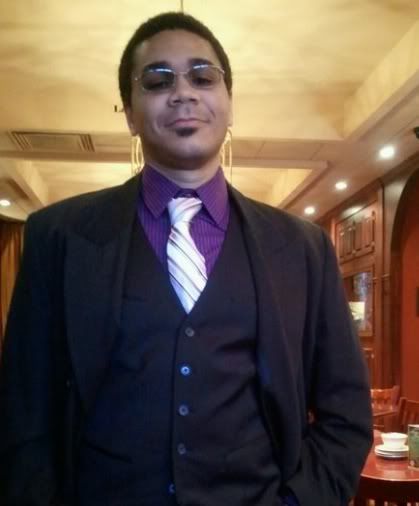
Does that look like a girl?
(That is me. I'm dressed up because my boyfriend got his Master's earlier that day. )
)
No formal replies yet... the update's text is almost done, so I'm making a push on my night off tonight to finish that and the graphics... I'll post formal replies as well with the update itself.
However, there's one issue I would like to address:

Does that look like a girl?
(That is me. I'm dressed up because my boyfriend got his Master's earlier that day.
^
Huh, will I guess that resolves that drama. Tune in soon to find out the next emotional, passionate, and riveting episode on...The Rome AARisen Thread!!!

Huh, will I guess that resolves that drama. Tune in soon to find out the next emotional, passionate, and riveting episode on...The Rome AARisen Thread!!!
You're black?? There goes my prejudice that only nerdy white guys were interested in Byzantine history 
Nice suit BTW! But your tie is knotted a tad sloppily.
Nice suit BTW! But your tie is knotted a tad sloppily.
Sweet suit, dude!

Lemme smash that stereotype even more. I'm certainly nerdy but not WhiteYou're black?? There goes my prejudice that only nerdy white guys were interested in Byzantine history
Nice suit BTW! But your tie is knotted a tad sloppily.
You look different than I imagined. You look like a mobster. From Vegas.
Couldn't have said it better :rofl:
Now I will forever imagine BT poisoning his enemies with that smug look on his face 
I'm switching it up... going backwards to forwards instead of forwards to backwards with my comments!
Vesimir – He's also as tall as Charlemagne. The question is, will great height lead to great rulership... or something else... one thing is for certain, he wants to be a warrior, at least. Though he's still got some strange interests on the side...
Theodors appears in the update below. He may or may not have a future appearance after this...
And I have no doubt some future ruler is going to dabble in the occult at least...
Zzzzz... – Headaches and bad mood swings. This could turn out really well (a forceful ruler that crushes the realm to his own will and ends the civil war), or really bad (bloodthirsty insane tyrant)... and yes, the Jayshallah is getting more and more formidable by the year. Every victory would bring new recruits and new collaborators. Taymiyya now has a fairly secure base... its time to see what he'll do when he has a bonafide army at his back...
...and you might be pleased with some of al-Hinnawi's prescriptions. XD
vadermath -I don't have HBO in the States, so I've only seen what I can find on Youtube. I own the entire book series though (G.R.R. Martin is one of my writing heroes), and I definitely[i/] plan on buying the series when it comes out on DVD! And yes, Andronikos doesn't quite 'get it' on how the Empire was made. He was raised in a Danish court in exile, and probably has had his ears filled with stories of Demetrios Megas, Basil, and Thomas Nikitis. Ironically, he probably intimiately knows many of the Danish nobles he'd be fighting against marching north...
LOL@the Emperor high off his rockers!
JacktheRipper21 – Well, keep in mind those weren't his 40,000 men. He wasn't their commander, more the seniormost prince by right of birth amongst a committee of commanders. The committee structure of that command is what doomed it far more than Theodoros' own abilities. A group of princes jockeying for command doesn't bode well for their army, especially facing an army that is unified under one man.
And yes, Leo does[i/] control Rome. Look for some shenanigans to come out of that situation...
wolfcity:
1) You'll get Andronikos' stats this update. You'll see why I held one of them back at least. His are the last stats I have before the crash eliminated all the pictures for the first half of the 14th century. I'll keep providing stats based off of memory, but they'll be guesstimates, not the actual ones unless the character was still alive post 1354...
2) Egypt's got a good base to build from, but historically Egyptian empires that have moved into the Levant always find themselves struggling with multiple enemies at once... just as Egypt is strategically easy to hold, the Levant isn't...
3) Perhaps... right now it seems he's definitely leaning more towards Roland than Sbyslava. Alot will depend on Roland's skill in keeping his young lion in line with his interests...
4) I had an interim like that in mind after the end of this chapter...
The Arch_duke – It has been forever since you got to yell your favorite battle cry. Perhaps there will be some future character that might deserve such... dishonor? XD
Baldor Arbanus – The Hashashin, like most of the Ismailis, emigrated en masse to Egypt in the 1240s because of the Mongol invasions, and formed one of the first constituencies that converted easily to Aionism. The more militant parts of Aionism were almost wiped out in the rebellions of the 1370s and 1380s (mostly at the hands of the first Army of God, in which Taymiyya was a commander), I'm assuming the hashashin took a heavy blow there. Likely, their remnants are still in Egypt...ooo...now I have some ideas!
loki100 – Thank you for the words of praise. I'm glad to hear I keep making improvements. My writing skill has a long way to go, but half of this project for me was an excuse to write, and write often... it's the only way to get better. And I would be humbled to be called awful in that sense! lol
OpenBlueJoe - Heh. Theodoros ends up with a role, albeit one he possibly doesn't want, in the next update. Like I said, however, he may or may not make a future appearance, and perhaps he could even become key...
As for Persia, no, they probably don't know the monster they've let loose. Keep in mind Isaakios' brother, Alexandros of fame, did the same thing in the 1370s when the Aionites sensed Persia was weak and rebelled in Mesopotamia. He basically used the hatred of most local Muslims, as well as the words of the Caliph in Isfahan, to urge the creation of the original 'Army of God' to put down the rebellion while he set about rebuilding the Persian army. When some of the 'Army' went rogue after the Aionite rebellion, Alexandros finally had men enough to take control of the situation, and even captured Taymiyya in battle...
And yes, Andronikos is probably the most physically imposing Komnenid to claim the throne... only the original Demetrios came close, and I think he stood six foot if I remember correctly. Like you said, there are physical harbingers that all is not right, but if they can be put under hand, the young man is clearly intelligent as well. Good things could come...
Nehekara – Further indignity awaits him in the short term. Long-term, however, who knows? Du Roche is doing amazingly well for himself so far. He's turned Megoskyriomachos into a position of authority once more, and is successfully holding his own against Empress Sbyslava for influence over her son. So far...
Du Roche is doing amazingly well for himself so far. He's turned Megoskyriomachos into a position of authority once more, and is successfully holding his own against Empress Sbyslava for influence over her son. So far...
Andronikos needed to be someone who was young but looked like a warrior—intelligent eyes but partially menacing. Robb Stark, at least from the Youtube clips, fit the bill. And Guillaume I imagine as a pretty boy looks wise.. Lancel fit that bill (though Guillaume probably has ten times Lancel's wits, at least in A Game of Thrones...)
cezar87 - Well, there's always the option that Andronikos could have multiple things going on with him... And al-Hinnawi is going to cause a great deal more ruckus than you can imagine!
And yes, this Romanion is one that wouldn't be recognized by Demetrios, Basil or even Nikolaios. Manuel I might recognize parts of it, as would Albrecht, but something this large, sprawling, and just broken would still be partly alien to them. The Empire, or what's left of it, is in new territory...
Laur – I'd imagine they'd be prescribing more than just leechings or bloodlettings, but like any good self-promoter, al-Hinnawi goes after the tactics of his opponents that will generate the most talk. A brain tumor? Maybe... it'd certainly fit the symptoms... and it's a single diagnosis as opposed to multiple ones. We'll see though...
Bagricula – Maybe during the process he turns into a giant worm too, and uses fear and terror to turn humanity into something better to survive a coming doom. There, we've tossed Leto II in there as well! XD And Andronikos does have weird intellectual interests... Necromancy though... hmmm...
I would think about talking to them... I have no idea who I would talk to, or what would happen to the story posted on here if something like that did happen. I'd also have to rewrite large parts of the earlier sections. My writing's improved a bit, and I wince looking back at what I did before. I'm sure in five years I'll be wincing at my writing here too XD
Leviathan07 – Metabolic condition? There are some that could cause some of these symptoms. Yet another possibility. As a side note, I love whenever an emperor shows signs of 'strangeness' the thread devolves into a House episode. It's awesome!
von Sachsen – I won't surrender the goods, and just say, yes, a glandual tumor is another possibility. We're at four now, as of my last count...
BraidsMAmma – I got your emails (as you saw), and excellent work! Pleased, happy, they don't describe how I feel about the work you did! I think once you/I finish putting the chapters of the first book into pdfs, I'll upload them and post a link for everyone.
And getting mentioned in that article was an honor. To whomever made that, if you're reading, thank you! Is it a hobbyist organization?
And yes, Dante wrote a play about Manuel. In his cameo, remember, he was a sailor that dabbled in writing. The play wouldn't exactly be well known! XD
Siind – Bipolar could fit, as I said above. There might be a few more hints in the next update as to what's going on with him...
humancalculator – Indeed! Glad to see you're still reading!
Welshdude – I'm a he! Lol. Also you'll be pleased to see there's an update below!
TC Pilot – If I was a woman, I can tell you my boyfriend would be unpleasantly surprised! XD
Nikolai – Was it effectively answered? lol
Vesimir – He's also as tall as Charlemagne. The question is, will great height lead to great rulership... or something else... one thing is for certain, he wants to be a warrior, at least. Though he's still got some strange interests on the side...
Theodors appears in the update below. He may or may not have a future appearance after this...
And I have no doubt some future ruler is going to dabble in the occult at least...
Zzzzz... – Headaches and bad mood swings. This could turn out really well (a forceful ruler that crushes the realm to his own will and ends the civil war), or really bad (bloodthirsty insane tyrant)... and yes, the Jayshallah is getting more and more formidable by the year. Every victory would bring new recruits and new collaborators. Taymiyya now has a fairly secure base... its time to see what he'll do when he has a bonafide army at his back...
...and you might be pleased with some of al-Hinnawi's prescriptions. XD
vadermath -I don't have HBO in the States, so I've only seen what I can find on Youtube. I own the entire book series though (G.R.R. Martin is one of my writing heroes), and I definitely[i/] plan on buying the series when it comes out on DVD! And yes, Andronikos doesn't quite 'get it' on how the Empire was made. He was raised in a Danish court in exile, and probably has had his ears filled with stories of Demetrios Megas, Basil, and Thomas Nikitis. Ironically, he probably intimiately knows many of the Danish nobles he'd be fighting against marching north...
LOL@the Emperor high off his rockers!
JacktheRipper21 – Well, keep in mind those weren't his 40,000 men. He wasn't their commander, more the seniormost prince by right of birth amongst a committee of commanders. The committee structure of that command is what doomed it far more than Theodoros' own abilities. A group of princes jockeying for command doesn't bode well for their army, especially facing an army that is unified under one man.
And yes, Leo does[i/] control Rome. Look for some shenanigans to come out of that situation...
wolfcity:
1) You'll get Andronikos' stats this update. You'll see why I held one of them back at least. His are the last stats I have before the crash eliminated all the pictures for the first half of the 14th century. I'll keep providing stats based off of memory, but they'll be guesstimates, not the actual ones unless the character was still alive post 1354...
2) Egypt's got a good base to build from, but historically Egyptian empires that have moved into the Levant always find themselves struggling with multiple enemies at once... just as Egypt is strategically easy to hold, the Levant isn't...
3) Perhaps... right now it seems he's definitely leaning more towards Roland than Sbyslava. Alot will depend on Roland's skill in keeping his young lion in line with his interests...
4) I had an interim like that in mind after the end of this chapter...
The Arch_duke – It has been forever since you got to yell your favorite battle cry. Perhaps there will be some future character that might deserve such... dishonor? XD
Baldor Arbanus – The Hashashin, like most of the Ismailis, emigrated en masse to Egypt in the 1240s because of the Mongol invasions, and formed one of the first constituencies that converted easily to Aionism. The more militant parts of Aionism were almost wiped out in the rebellions of the 1370s and 1380s (mostly at the hands of the first Army of God, in which Taymiyya was a commander), I'm assuming the hashashin took a heavy blow there. Likely, their remnants are still in Egypt...ooo...now I have some ideas!
loki100 – Thank you for the words of praise. I'm glad to hear I keep making improvements. My writing skill has a long way to go, but half of this project for me was an excuse to write, and write often... it's the only way to get better. And I would be humbled to be called awful in that sense! lol
OpenBlueJoe - Heh. Theodoros ends up with a role, albeit one he possibly doesn't want, in the next update. Like I said, however, he may or may not make a future appearance, and perhaps he could even become key...
As for Persia, no, they probably don't know the monster they've let loose. Keep in mind Isaakios' brother, Alexandros of fame, did the same thing in the 1370s when the Aionites sensed Persia was weak and rebelled in Mesopotamia. He basically used the hatred of most local Muslims, as well as the words of the Caliph in Isfahan, to urge the creation of the original 'Army of God' to put down the rebellion while he set about rebuilding the Persian army. When some of the 'Army' went rogue after the Aionite rebellion, Alexandros finally had men enough to take control of the situation, and even captured Taymiyya in battle...
And yes, Andronikos is probably the most physically imposing Komnenid to claim the throne... only the original Demetrios came close, and I think he stood six foot if I remember correctly. Like you said, there are physical harbingers that all is not right, but if they can be put under hand, the young man is clearly intelligent as well. Good things could come...
Nehekara – Further indignity awaits him in the short term. Long-term, however, who knows?
Andronikos needed to be someone who was young but looked like a warrior—intelligent eyes but partially menacing. Robb Stark, at least from the Youtube clips, fit the bill. And Guillaume I imagine as a pretty boy looks wise.. Lancel fit that bill (though Guillaume probably has ten times Lancel's wits, at least in A Game of Thrones...)
cezar87 - Well, there's always the option that Andronikos could have multiple things going on with him... And al-Hinnawi is going to cause a great deal more ruckus than you can imagine!
And yes, this Romanion is one that wouldn't be recognized by Demetrios, Basil or even Nikolaios. Manuel I might recognize parts of it, as would Albrecht, but something this large, sprawling, and just broken would still be partly alien to them. The Empire, or what's left of it, is in new territory...
Laur – I'd imagine they'd be prescribing more than just leechings or bloodlettings, but like any good self-promoter, al-Hinnawi goes after the tactics of his opponents that will generate the most talk. A brain tumor? Maybe... it'd certainly fit the symptoms... and it's a single diagnosis as opposed to multiple ones. We'll see though...
Bagricula – Maybe during the process he turns into a giant worm too, and uses fear and terror to turn humanity into something better to survive a coming doom. There, we've tossed Leto II in there as well! XD And Andronikos does have weird intellectual interests... Necromancy though... hmmm...
I would think about talking to them... I have no idea who I would talk to, or what would happen to the story posted on here if something like that did happen. I'd also have to rewrite large parts of the earlier sections. My writing's improved a bit, and I wince looking back at what I did before. I'm sure in five years I'll be wincing at my writing here too XD
Leviathan07 – Metabolic condition? There are some that could cause some of these symptoms. Yet another possibility. As a side note, I love whenever an emperor shows signs of 'strangeness' the thread devolves into a House episode. It's awesome!
von Sachsen – I won't surrender the goods, and just say, yes, a glandual tumor is another possibility. We're at four now, as of my last count...
BraidsMAmma – I got your emails (as you saw), and excellent work! Pleased, happy, they don't describe how I feel about the work you did! I think once you/I finish putting the chapters of the first book into pdfs, I'll upload them and post a link for everyone.
And getting mentioned in that article was an honor. To whomever made that, if you're reading, thank you! Is it a hobbyist organization?
And yes, Dante wrote a play about Manuel. In his cameo, remember, he was a sailor that dabbled in writing. The play wouldn't exactly be well known! XD
Siind – Bipolar could fit, as I said above. There might be a few more hints in the next update as to what's going on with him...
humancalculator – Indeed! Glad to see you're still reading!
Welshdude – I'm a he! Lol. Also you'll be pleased to see there's an update below!
TC Pilot – If I was a woman, I can tell you my boyfriend would be unpleasantly surprised! XD
Nikolai – Was it effectively answered? lol

“An Emperor must be ruthless and cunning, his wrath must be deadly. He must be willing to crush his enemies by foul means as well as fair. Fear and love together bind a realm to its ruler. An Emperor that neglects one for the other does himself, and his people, a great disservice.” - Roland du Roche
April 18th, 1309
Jeddah the Beautiful, they called her.
The capital of the Roman Kingdom in Arabia certainly had its charms. It was a major port for the Red Sea trade, a place where silver flowed freely between merchants, traders and even the occasional sailor. It was also a seedy den, a place for cutthroats, liars, and thieves—all the garbage that could be washed in by desperation and the sea. Inside that warren of coffee houses, domed mosques and churches, crowded tenant houses and colorful merchants sat a small slice of paradise, built by coin charged to those traveling on the annual hajj. The sea was the quickest, safest way for most pilgrims to reach the Holy City, and Jeddah was the only port remotely close to the tiny inland beacon of Mecca. House Donauri had done relatively little to try to change the traditions of its Muslim subjects—it was too dangerous, as well as too lucrative—and the one silver for guaranteed passage to the city in caravans guarded by royal guards on the royal road through the sands paid handsomely for the royal family's manse, surrounded on all sides by high whitewashed walls that enclosed pavilions, fountains, and seemingly all things light and beautiful.
Georgios III Donauri shifted uneasily on his gold and ivory inlaid throne, the gentle beat of fans failing before the heat of midday. The wooden monstrosity was covered with glyphs and Arabic calligraphy. Long ago, the Metropolitan had claimed some of those images were secret Muslim prayers calling for the restoration of the Holy City. Georgios told the man to keep his mouth quiet—ruling here was difficult enough, without every one of his subjects and even bannermen looking all over the throne he didn't want for words encouraging rebellion. It'd been only ten years since Layth, and only the same ten since the previous Yemeni attempt. The Rigas looked to his left, and nodded to the well-dressed man of dark skin and many gold rings.
Thank God for the Abyssinians and the Omanis keeping the Yemenis busy, the King thought, blinking as dark words were read before him.
Yes, Georgios was called Fahd by his often reluctant people, for his bravery in the field. However, ruling the Arabian wastes required a sharp mind, as much as a sharp blade. The Kingdom had barely 15,000 in its army, and it lay in a hostile land, with the large and powerful Yemenis to the south. It was one thing to break the Yemenis in the field as he did at Jidin, it was another when they allied with one of his own cities. The Abyssinians kept the Yemeni army away long enough to Layth to become an example, but the strain on the small Arabian army was telling. There were only so many men, and they were spread thin, defending from desert raiders, garrisoning the cities.
And, as the messenger promised only moments before, Taqi a-Din ibn-Taymiyya was coming.
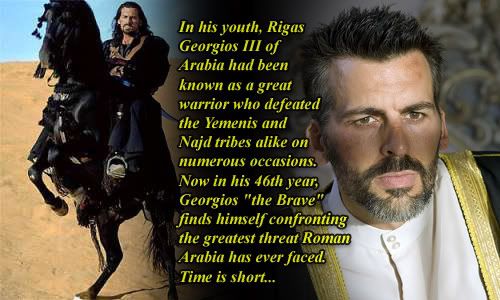
The closer Taymiyya came, the more rumblings came from the streets. At first, there were only itinerant preachers, and Georgios assumed they were the usual doomsayers and megalomaniacs that prowled holy sites, preying on the foolish and vulnerable. Then word came from the north—this city and that falling, then word the Levantikon fell, then the Army of Princes. Talk amongst street preachers became talk within the peasants, then artisans, then the barracks. One name was on everyone's lips, and Georgios could feel the heat of Taymiyya's breath pressing close on his kingdom. There was talk that the elders in Medina were rousing men and contacting the desert tribes. The Sharif in Mecca hosted Taymiyyites at his home. Hassan had already presented Georgios with a list of men in the army he suspected of having pro-Taymiyya sympathies.
The list was too long.
There was a tension in the air, the sharp tingling on the back of the neck before a lightning bolt crashed down from the heavens. It would be Ramadan in a few days. One spark, and the spell of quiet Layth had built for the last decade would be broken, and no number of soldiers would hold the people at bay. If he crossed into the Hejaz, Georgios would have two armies to fight—Taymiyya's, swollen now to ungodly size, and an army of his own people. The Sultan of Yemen had already proclaimed himself a follower of Taymiyya's teachings—how long before the Sharif, or Medina, or even Jeddah, did the same?
A year ago, Georgios had seen the gathering storm. He'd called in loyal commanders, and shoved aside what disloyal ones he could. He'd sent out spies, agents, scouts, all manners of eyes and ears to keep the court in Jeddah informed. Most importantly, however, he sent messengers—to Isfahan, to Alexandria, to Konstantinopolis, begging, pleading for help. Konstantinopolis, as always, would be too busy, and Georgios had long suspected the Persians had something to do with the sudden rise of this new Islamic threat.
So his hopes rested on his cousin Hassan, and his delegation to the court of Prince Isaakios of Egypt, and the words and advice of the men gathered around his table in Small Council. Of course there was the commander of his army, a logical voice to have at this most important discussion. Isa ibn-Quriash was a descendant of the Muslim prophet whose father had converted—one of several relatives of the Sharif who did so under treaty with the Roman lords. He was the lone Strategos in an army made up of chillarchoi, not tagmata. Then there was his Master of Ears, a mute named Sabbah who, by choice, said nothing during a council meeting—he said he helped him focus on listening, and better determining who was loyal and who harbored treacherous thoughts. The Abyssinian ambassador stood in the corner—Georgios had a feeling what the message to be read to his Small Council might say, and the Abyssinians had long be useful allies of Arabia. Perhaps they could help a little, if only by pressuring the Yemenis more.
Then there was Metropolitan Gregorios Choumnos, the one man Georgios did not want present—King he might be, he had little choice, however. By treaty, the Rigas ton Arabion was required to accept a Metropolitan appointed by the Patriarch of Konstantinopolis as a legate, and head of all churches within the Arabian Kingdom. Since the days of the first Georgios, the Metropolirans had always been a headache for the Donauris, screaming for the end of the hajj, the sacking of mosques, and all other manner of nonsense. The ponderous Choumnos, known for his vow to 'bathe once a month like a Christian, not once a day like a heathen,” was no different. Georgios had taken to calling the decrepit fool 'Old Stinky' behind his back.
Normally there would be one last person at the Small Council—Jaffar ibn-Hassan, another descendant of the few converts here and the Logothetes appointed to deal with foreign affairs. He was away in Alexandria, offering Arabia's arm and leg to Egypt for her intervention. In his place was a stranger, clad in rough linens but with a regal bearing that came from his name, not the message of doom he brought with him under close guard by the 20 Taymiyyites now camped in the palace gardens. The harsh words had scarcely left his mouth, leaving a stunned, confused silence in their place.
Then, the murmuring started.
Everyone had known for the previous year this day would come. Now that it had arrived...
“Again?” Georgios leaned forward slightly, the tittering in the council chambers falling away as he thanked the Almighty once more that his servants were Christians. They'd keep those dark words close, and not let it spread to the street. That would buy them a few days, maybe a few weeks if they were lucky.
“In the Name of God,” Theodoros Komnenos, former 'commander' of the Prince's Army began again, reciting a message no doubt forced into his mind by his captors, sweat running from his brow, “the Most Gracious and Merciful. After salutations from Taqi al-Din Ibn Taymiyya, One of the lowly slaves of the Lord unto the puppet of the Rum. Although the Law engenders us to extend three choices to the nonbeliever such as yourself, the consensus of the ulema places you in a predicament that obfuscates the normal...”
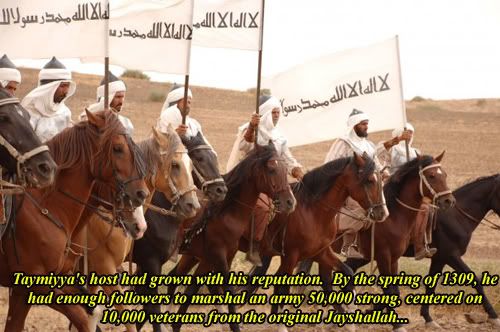
“Can't the man use bloody Greek I can understand?” Quriash grunted in his Arabic patois. “He prattles on worse than...” the Strategos' eyes flashed momentarily towards Metropolitan Choumnos. The priest's gaze was too focused on the fallen Komnenid to notice.
“Your desecration of the Old House and the Beloved's grave,” Theodoros the Fool, the Exile, went on, “forces us to give you two choices, of which there is no respite. Either you kneel before the tawheed and join us in a pure monotheism in rejection to the idols of disbelief, and accordingly, what is upon us is upon you, and what is for us, is for you, or that you abandon the holy cities either willingly or at the point of my sword...”
“And we get to the point of his letter,” Georgios nodded with a sigh towards the fallen commander of the Army of Princes. From son of an Emperor, to rebellious lord, to no more than a mere messenger for his captors. How the world has turned upside down. “My lords, it would appear that a horseman has appeared to our north. My Master of Ears tells me they have 50,000 or more coming together near Bethlehem, intent on marching south, with victuals and gear for a long campaign in the desert.”
“We can't stop that,” the Strategos snorted.
“Aye, we can't resist by arms,” Georgios murmured, rapping his fingers on the table. Chillarchos Mourtzes, the commander of the King's Bodyguard, had pitched every plan he could think of. Yet Georgios had reasoned the following events down to one simple conclusion—defeat, or even death.
Egypt was their only hope.
Unlike the others, Egypt would care who took Arabia—it was not a backwater to them, a place to send exiles. It was a jaw closing up one half of their major trade link to the Indian Ocean. The Donauris had built up a strong relationship with the Egyptian princes the preceding fifty years—uninhibited trade helped fill Alexandria's wharves, and ship's docking for victuals filled Jeddah's coffers. Egypt would never tolerate a hostile Arabia next to her...
Time, Donauri thought, I need time!
The terms sent to Egypt were favorable, most favorable. Egypt was large, Egypt was powerful, Egypt was untouched by the wars ravaging the Old Empire. But Egypt would need time to mobilize her armies, marshal her fleets, and send such a force to Georgios' land. His proposal called for begging Isaakios to send an army through the Sinai and another to Jeddah proper, but even word of such a move would help. The Egyptians were powerful enough, and menacing enough, Taymiyya would have no choice but to pause his advance!
Georgios just needed time!
The king's knuckles kept knocking on the table, each rap another idea, another thought, another plan racing ahead, only to be lanced by reason and circumstance. Hiding in the desert was suicide—Taymiyya's men were equipped for such a war, and once he arrived, he'd have plenty of guides that could lead him to the King and his ragtag army. Waiting out a siege wouldn't work either—Jeddah's defenses were strong, but not impenetrable, and holing up in the capital meant losing the rest of the Kingdom and encouraging dissent within the walls...
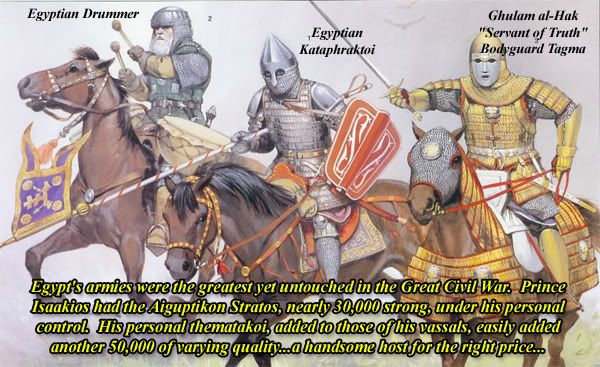
...then it hit him... something so desperate, so bold, it might, might just work...
“Send word back we will convert,” Georgios said slowly. “If...”
“What?!?” the table shook as Metropolitan Choumnos erupted from his seat, the loudest in an explosion of dissent from his close counselors.
“If Master Taymiyya consents to giving us two months to persuade and convert our nobility for the stability of the realm...” the King tried to continue.
“This is an outrage! Heathenistic! Barbarian!” Choumnos thundered on, with no small amount of support.
“It's a ruse!” Georgios shouted before the man could explode further. “For the love of...it's a ruse! It will give us time to bring in Egypt...”
“That land of heretics?!” Choumnos gruffed. He sat down, but his face spoke thunder and earthquake—he'd made his feelings apparent a year before when the King had sent his entourage to Alexandria to begin negotiations in the first place.
“Better heretics here than Taymiyya making us all kneel to the Caliph and renounce Christ,”Georgios sighed. That was not an option—the Empire was confused, broken, but it would reunite, eventually. It always had, it always would. And when it did, the might of a world stretching from Spain to the Black Sea would crash down on Taymiyya, his followers, and tiny little Arabia. “I am sure they have accepted Lord Hassan's terms...”
“Kneeling before heretics?” Choumnos sighed, patting his forehead with a hankerchief.
“I...” Strategos Quraish sighed, before looking at his king. Georgios grunted.
“Noble Choumnos,” Georgios phrased things as politely as he could, “They won't force a conversion on us. They simply want us to allow access by their priests to come to Jeddah, and Mecca, and acknowledge them as our protector. They have no other vested interest here than keeping the Red Sea open,” the King went on.
“And how do we know they'll keep those... words?” Choumnos raised an eyebrow, making Georgios grip the arm of his throne a little harder. There were days he cursed the Metropolitan's name, and wished he would just die already. Any replacement would be better than Old Stink.
“Because,” he slowed down, as if speaking to a child, “They hate Taymiyya with a passion! He would close off the Red Sea to their ships, and he slew who knows how many Aionites in Mesopotamia years ago!” the King's voice rose in anger. He'd explained this a dozen times, ten dozen times! “He is their dark horseman, the man they use to frighten their children even as they shiver in their summer heat! They'll do anything to harm him!”
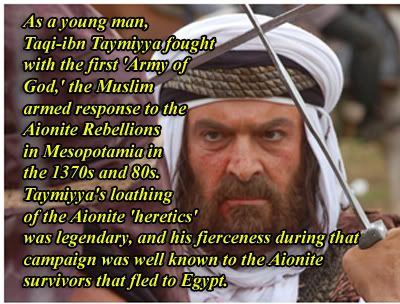
“And this...notice...” the Exile said, voice stinted with surprise, “will buy you time? My... compatriots,” a corner of the Komnenoi's lip twisted upward in a frightened smile, “won't be very obliging to a slow trek. They will drive me north with the speed they drove me here.”
“I...think it will,” Georgios nodded, both for the council and himself. It was a gambit. If it bought them three or four weeks even—just long enough for an Egyptian fleet to bring soldiers to Jeddah, it would be worth it. “Sabbah,” he turned to his spymaster, “keep word of this off the street as best you can,” Georgios said grimly. “It will get out eventually, but we need time. Jeddah is worth ah'hd, but,” he smiled thinly at the furious Metropolitan, “I don't want to make the walk to the mosque unless I have to.”
“Thank the Lord above for small favors,” Georgios thought he heard the Metropolitan mutter. Damn that man, and damn his mother for spreading her legs!
The King bit his lower lip, but said nothing.
“I'll talk to Abdas,” the King went on, focusing his efforts on something useful. Al-Taymiiya was known not only for his piety, but the fervent, righteous anger he unleashed on those who worked with the Romans and profited by them. Many a now rich, noble and Muslim house in Arabia had grown, taking the place of some hapless clan cut low by the Roman blade. Maybe with some words, and a little coin... “Sound him out, as well as the other convert and raised families. In the meantime,” he nodded towards the Abyssinian ambassador, “My lord, I will need word with you in my private chambers. And Lord Choumnos?”
“Yes, my liege?”
“Pray to God we hear back from Egypt before Taymiyya's men can reach Jeddah and spread word of our... conversion.”
==========*==========
June 21st, 1309
Two men circled slowly, their feet treading over soft grass. Two men, performing the dance of death.
Their eyes were locked on each other, and an audience of almost 100,000 watched as well. Danes, clad in their hauberks, stood riveted, their axes almost forgotten in their hands. Romans sat proudly on their chargers, lances loose, drooping in the breeze. All told themselves they must be ready, they must be prepared, but the spectacle before them stole their attention and held it fast.
It was a strange day, after all, that a King dueled with an Emperor.
Andronikos Komnenos, Second of that Name, took yet another step to the left, watching King Skjalm Knytling of the Danes. This was not the first time they had dueled. In another life, Skjalm trained a young Andronikos in the way of the sword during his exile in Havigraes. Now was just like then, save the blades they carried were steel, not wood, and the intent was to wound limbs, not pride.
Now, like then, the world seemed to flash alive for Andronikos. He let everything else go, saw, felt, sensed his opponent as the two circled, blades still sheathed, watching, waiting. The rest of the world seemed to go a riot of color and a shade of grey at once—Andronikos felt his own heartbeat even as he saw a bead of sweat across his godfather's forehead. It was everything, and nothing. Was Skjalm nervous? Was his confident? Was he injured or sick? The gait, the stare, the sweat, the eyes—they all spoke volumes.
Andronikos knew what his gaze spoke. The headaches that had plagued him had dulled, thanks to the ministrations of al-Hinnawi—especially the physicians special recipes to improve the Emperor's health. His stomach was filled with al-Hinnawi's concoction—a blood sausage mixed with cannibis, hemp, rosemary and thyme. He felt cool, calm, his head peaceful, his thoughts cleared. His hands tingled slightly in the wind as he watched his opponent the way a lion stalked a mouse.

He smiled—and Skjalm smiled back. No doubt his godfather assumed the boy was following his teaching—always show confidence, always show control. Andronikos did more than show control—he knew he was in control. The Danish army stood afar, quiet, eyes all watching the slow circling of a pair of men between their ranks. The fact there were no horns, no cries, spoke good news.
Perhaps du Roche was right to buy the services of those Mongols—half a tumen seemed a small force for the princely price of campaigning to restore yet another Mongol khan to a lost birthright, but if those Mongols had sliced and torn the Danish flanking scouts, then no one was looking back, while a Duel of Kings took place in front.

Oh, and what a duel it would be! Andronikos' smile grew wider and wider. He remembered the look on Skjalm's face. There'd been a flag of parley that morning, and no doubt Andronikos' godfather expected his godson to try to merely posture and threaten—Skjalm's army was battle-hardened, and larger than Andronikos'. The flat terrain favored the more numerous Danish horse.
As the Megas Komnenos watched, the Danish King slowly drew his sword, eyes never leaving his godson. Skjalm had always loved combat, and Andronikos' ears had been filled with deeds of the older man's bravery in poetry and song. Andronikos knew what would happen when he said those words in the perfect pitch and tone of Old Danish, the most hallowed tongue in Sortmark. They had echoed loud and clear over the plains overlooking the Pruth...words that Andronikos knew could not go unanswered, unchallenged:
“Skjalm, son of Olaf of Clan Knytling! You have done me and mine a grave dishonor, disheveled our name and soiled our honor! If you area true man," Andronikos had called,"answer the call of the einvigi! Satisfy my honor, or show all present you are honorless, craven, and son of a fatherless whore!"
So now they circled.
Swords were the chosen weapons. Skjalm chose a shield. Andronikos chose to just use his weapon. The contest was completely unregulated, over howls of protests from the retainers of both sides, but einvigi was strict in only one way—there were no rules, other than those the duelists agreed on.
Thus, there were no rules in this match. Period.
“An Emperor must be ruthless and cunning, his wrath must be deadly. He must be willing to crush his enemies by foul means as well as fair...” All those words of advice from the Megoskyriomachos loomed in Andronikos' mind. Strike before your enemies were prepared. Show your enemies one thing as you prepare to destroy them with another. Plots within plots, plans within plans. That was how an Emperor must think.
Not a King, backed into a corner by his position and honor...
Skjalm stalked to the left, his blade tapping the ground. He kept his shield low—Andronikos remembered this from their sparring days. It kept his arm strong, and the moment Andronikos' blade broke from a feint to an attack, that shield would flash up with a lightning speed that surprised most foes. His face was unmoving, his sword steady, but long ago, a once exiled prince learned to watch a man's eyes in a fight, not his hands. Skjalm's were steady, but behind those cool orbs something burned—fear, hatred, anger, it mattered not. The challenge of the einvigi, the brutal call to honor that had dwarfed the more tame Hólmgang amongst the Danes of the steppe, had stung, and stung deep. Skjalm had been boxed in, and he resented it.
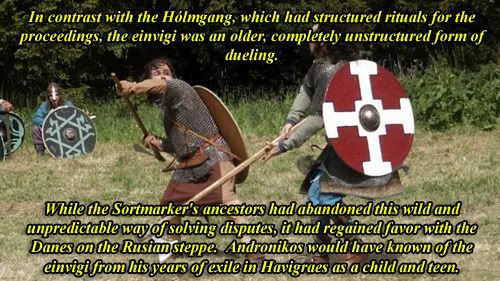
He was king of a people bound by their honor, where the lack thereof led to one being ostracized, or worse. For him, the King, to decline such a challenge would have rendered him shameful, craven, a niðinga—less than a thief, less than a murderer. A no one, and certainly no king.
Slowly, Andronikos drew his own sword, steel scraping against leather as the slow circle continued. It was a monstrous thing, its hilt as plain as its four and a half feet of cold steel. Andronikos had tried and tested the other, formal imperial blades--Kyriomachos' balance was off, a remnant of when the blade was reforged. Pyroglossa had been designed for Andronikos' grandfather who was not a giant in stature—it felt like an oversized dagger, not a true blade. Only Storm came close, but even then, it was a few inches short of what Andronikos would have liked—he had a natural reach over most opponents, an advantage he was loathe to give away.
Hence the monstrous longsword in his left hand, its sharpened steel pointing towards his godfather, daring the Danish king to try to knock it aside.
Slowly they danced the true dance of the sword—the careful circle of men gauging each other, their intentions, their strengths, their weaknesses. Skjalm had firmly believed that every duel was won or lost before the first blow was struck—advice Andronikos took to heart. It was only convenient that it served the Megas Komnenos' purposes quite well.
Andronikos felt his arm quiver slightly—oh, it was so hard! He desperately wanted to hear the ting of metal against metal, to swing, to feel the shiver that ran down a blade when it sliced into flesh and bone. That was why he wanted war... to feel that tingle down his spine, the one he got when gutting a deer!
He forced himself to hold his blade steady, the circle slowly continuing. No, he couldn't kill Skjalm. Not yet. He would be far too useful alive...
“Treachery! A bowman!”
Skjalm's eyes flashed away from his opponent, his blade lowered momentarily as he gave in to confusion. His bodyguards looked back, staring at the ranks, confused as to who would commit this outrage against the code of warriors. Andronikos had only started to smile when his own seconds, expecting the planned call, rushed forward, past him, towards the confused Danes. The song of steel sung sharp and sweet for only a few moments, then it was over—ten dead Danes, one wounded Hetaratoi, and a confused, enraged Skajlm surrounded by Roman steel.
“Move up!” Andronikos heard the drums and trumpets as his lines rumbled forward, the prearranged plan in case of treachery, as howls of confusion and rage roared into the air from his Danish enemies. The Emperor made a note to hand the young kentarchos in the Hetaratoi who had shouted the 'warning' a heavy pouch of gold. Idle thoughts trickled in the back of Andronikos' mind—Psellos was his name? Yes, the descendant of generals and princes. A thunder rose in the air, as the Hetaratoi and Palatinoikoi escorts quickly covered the hundred yards between their emperor and his army moving forward.
“What is the meaning of this?” Skjalm roared, lunging towards the Hetaratoi guardsmen. By skill he could have beaten two, even five of them. Against nineteen, his blade was quickly knocked aside, and his royal majesty was soon shoved into the ground at Andronikos' feet. The Emperor's mind came back to the present, exuberance racing through his veins.
“Godfather?” Andronikos asked, leaning close to the ground. He could hear his heart pounding. He was so close! Mail and boots clinked as the Roman army deployed according to the plans carefully laid out by du Roche two nights before—infantry tagmata in the center, cavalry to the wings, the Hetaratoi and a unit of Palatinoikoi before the spears in the dead center of the line. An utterly conventional arrangement—no surprises to the naked eye. A minute or two more, and they'd be in position...
”Ruthless...”
“You're a weasel!” Skajlm hissed under the boot of a guardsman. “A stinking cur! A bastard son of a bastard...” his voice was lost in a tumult... as the Roman army finished taking position around and ahead of its Emperor, the Danish army was chanting, crying for blood, as nobles barked orders, getting the mass of enraged men into a formal battleline. They would come full-bore... that was obvious. And why not? They outnumbered the Romans. They had more cavalry on the flanks. Their troops were battle-hardened, strong. Their King had been taken by apparent treachery. They started covering their own hundred yards of gap—lumbering, then with cohesion.
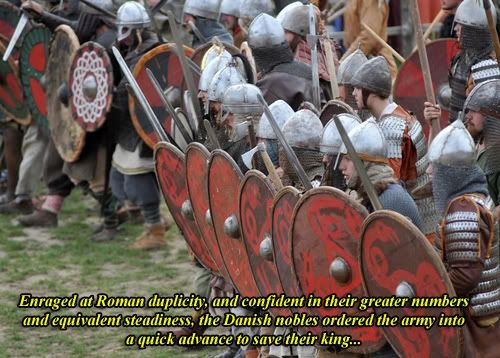
“Let him up!” Andronikos ordered, as a page brought his own charger forward. It'd gone far to easily—all those years in Havigraes, listening, watching, they'd paid well. Andronikos felt his own hand shaking has he sheathed his sword—it wasn't fear, but excitement! He'd waited for this day, for years—the day he'd prove his mettle, prove his name, sword in hand! He'd killed, but he'd never been in battle[i/] when he killed! He couldn't wait to ram his sword into the face of the first Dane he saw!
“...Cunning...”
And du Roche thought this was all a farce... Andronikos laughed to himself, and the world—a harsh, baying noise, like a jackal calling out its kill. It rang loud and clear, above the din of the Danish host, hastily aligned and plunging forward to put its numbers and strength to use. Andronikos looked up—they were only fifty yards away, closing with professional steadiness. His own ranks were dressed, but...
...there. The dust. The dust!
“Keep our prisoner tightly guarded! I want him to watch!” Andronikos called, mounting his charger. His eyes wandered to the left, behind the rapidly closing Danish line. Just behind them, moving figures, a small pall of dust clods rising from the air—the mark of 1,500 horsemen galloping at top speed. Andronikos looked back at his godfather and smiled as a roar of confusion once again rolled down the Danish lines. Their eyes turned back. Screams filled their lips.
“Roland du Roche, always on time,” the Emperor commented, drawing his blade.
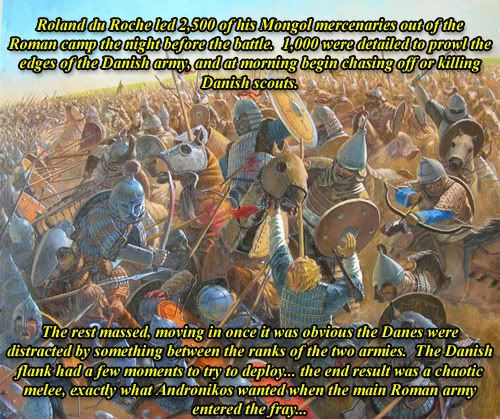
His eyes flashed back to the Danish ranks—confusion visibly rippled down the line as du Roche and his Mongol mercenaries peppered the Danish left and rear. The steady drums of the Sortmark advance stalled, men spun, confused, terrified.
Now, a quiet voice sounded in Andronikos' head. A look left and right. Yes, the Roman lines were dressed...
“...deadly...”
“Hetaratoi, charge line!” the Emperor bellowed as du Roche's flanking force slammed into the Danish rear. “Ready kontos! Charge on my command!” His eyes flashed left and right. “Tagmata! Advance on my command, at the double quick!”
Men died, horses screamed in that split second, the last bit of peace before all hell on earth would erupt. Andronikos heard some of his men praying, others cursing. The young Emperor, however, had only one thought on his mind as he held his new sword aloft, then slowly lowered it towards his confused and terrified foe.
Kyriofonias...
He glanced at the steel of his blade, as the trumpets and drum beat for a charge line.
Lordkiller.
A perfect name.
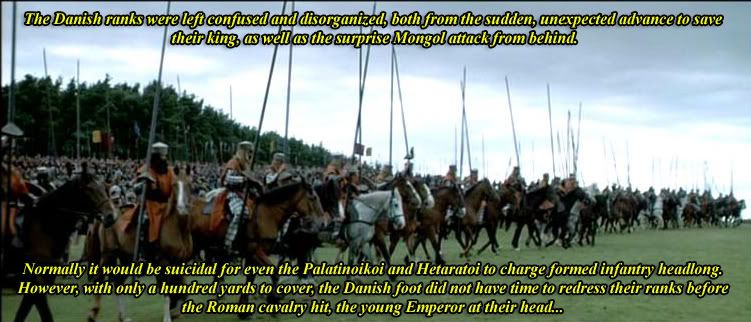
Last edited:
Oh snap. Andronikos has got teeth. I like him as a ruler. And I like the name of his sword. Lordkiller, that's a fearsome name right there.
And you have to feel bad for poor Georgios III. Facing a Muslim threat beyond anything he's ever seen before and all, and forced to rely on Aionite Egypt.
Either way though, fascinating story. Especially when you're like me, and re-reading the whole thing, and have no idea what's going on anymore. I'm currently at the spot right after Basil III dies, and I have no idea what's going on anymore, over a hundred years later.
Oh yeah, I almost forgot; I'm preparing to start my own Byzantine AAR; it won't hold a candle to yours, of course, but it'll be different from Rome AARisen and the other Komnenos for one very important reason: I'll be playing as a branch of the Dukas. Let's see if I can bring the Dukas to the same glory as the Komnenos.
And you have to feel bad for poor Georgios III. Facing a Muslim threat beyond anything he's ever seen before and all, and forced to rely on Aionite Egypt.
Either way though, fascinating story. Especially when you're like me, and re-reading the whole thing, and have no idea what's going on anymore. I'm currently at the spot right after Basil III dies, and I have no idea what's going on anymore, over a hundred years later.
Oh yeah, I almost forgot; I'm preparing to start my own Byzantine AAR; it won't hold a candle to yours, of course, but it'll be different from Rome AARisen and the other Komnenos for one very important reason: I'll be playing as a branch of the Dukas. Let's see if I can bring the Dukas to the same glory as the Komnenos.
I'm starting to like Andronikos more and more. A good, proper medieval ruler. A warrior tyrant to put Rome back on track.
Agree with the others. Andronikos is starting to turn into a good leader. I have a feeling that the Jayshallah will take Arabia.
Well, Andi II certainly has changed. If memory serves, when we first met him, Andi didn't want anything to do with the Empire and politics. Now it looks like he's enjoying himself...in a very dark, twisted sort of way  ).
).
Well lets see in summery Andi is really cool and has the stats to back it up. Thats about it. Also poor Georgios III  I dont think egypt will come (but ive been wrong before). Actully I think egypt will either not come or will come too late.
I dont think egypt will come (but ive been wrong before). Actully I think egypt will either not come or will come too late.
I think Egypt will get there just in time, save Georgios and will thus expand their influence around the Red Sea.
IIRC BT mentioned in an earlier update (way back in 2009 or 2008) that there would be a "Muslim uprising" in the middle east around the turn of the 14th century, ultimately unsuccessful. It matches the time we're in now, and Palestine also matches the geographic description. So I expect the Egyptians to come eventually, possibly too late to save Georgios' throne and life, but not too late to defeat the treat posed by Taymiyyah and his followers.
Hinnawi seems to have found a cure to Andi's condition. But Cannabis sausages? Would be soo much easier to just smoke it
Hinnawi seems to have found a cure to Andi's condition. But Cannabis sausages? Would be soo much easier to just smoke it

